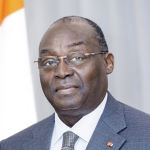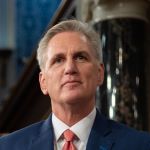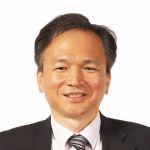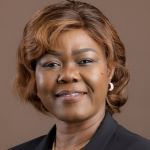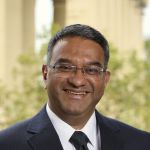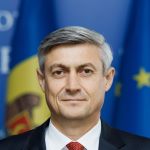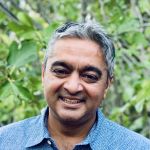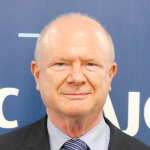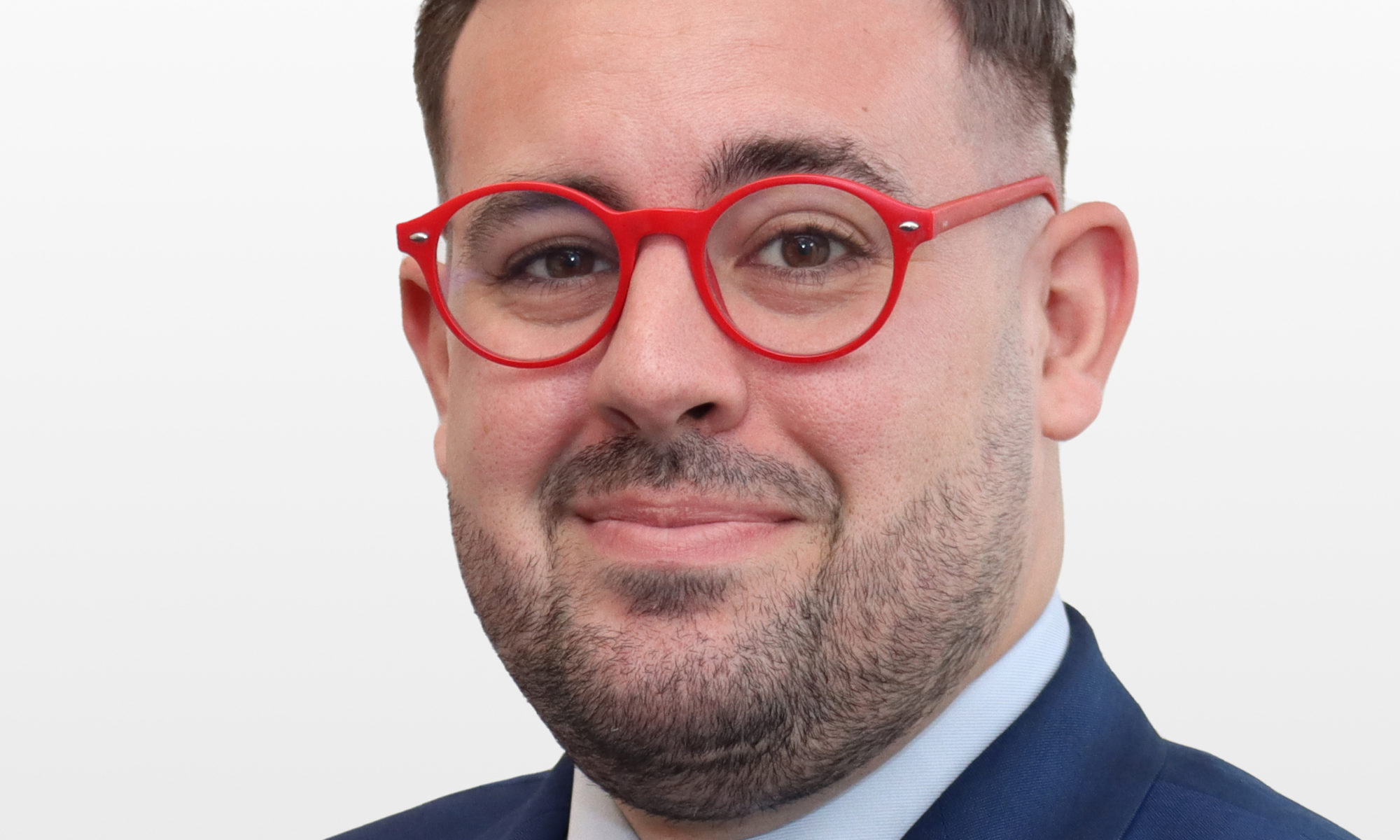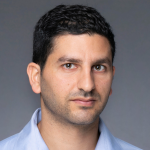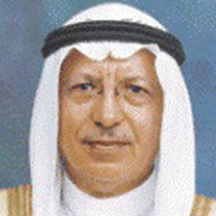Ambassador of the Republic of Slovenia to the UAE, Bahrain, Kuwait and Qatar since August 2022. Amb. Al Mansour started her diplomatic career at the Ministry of Foreign Affairs in 2004. Previously she held various positions at Embassies of the Republic of Slovenia in Tehran, Prague and Cairo, as well as at the Permanent Representation of the Republic of Slovenia to the EU in Brussels. Between 2019 and 2022 she was Head of Department for Africa and the Middle East at the Ministry of Foreign Affairs of the Republic of Slovenia, and held an additional (honorary) role as Coordinator for Equal Opportunities at the Ministry.
Benjamin Augé
Associate researcher at Ifri since June 2010. He holds a doctorate in geography from the Institut Français de Géopolitique (Université Paris 8), and is also head of investigations at Africa Intelligence. He teaches the geopolitics of oil and gas in Africa, the comparative African policies of the P5 members and relations between Africa and the Gulf at the Executive Masters programs of HEC and Sciences Po Paris. He also lectures at the Diplomatic Academy of the Netherlands (Clingendael).
Jamil Hallak
Chief Investment Officer of the Othaim Family Office. Jamil Hallak is a distinguished leader in global capital markets, with over 20 years of experience driving financial innovation and strategy at top institutions in Paris and London. His career began in Global Rates and Credit trading and portfolio management, where he quickly became known for his expertise in High Yield and Emerging Markets. Jamil’s ability to devise financing solutions during critical financial crises solidified his reputation in the industry. In 2009, Jamil led the Middle East and Africa trading business during the early stages of MENA’s debt capital markets growth. His leadership played a crucial role in navigating challenges such as the Arab Spring, the Dubai financial crisis, and various high-profile restructurings. Throughout his career, Jamil has held senior roles at prestigious financial institutions, including Société Générale, BNP Paribas, Standard Chartered, Deutsche Bank, and Credit Suisse. His strategic insights and leadership have significantly influenced the financial landscape at these organizations. In 2017, Jamil took on the role of Head of Investments at Riyad Bank during its transformation journey, aligned with the government’s ambition. He was key in recruiting talent, managing risk, developing new areas of expertise, and collaborating on strategic initiatives, earning him a prominent reputation within the Kingdom. Since 2020, Jamil has served as the Chief Investment Officer of the Othaim Family Office, where he continues to apply his deep expertise in capital markets to drive financial success and innovation. His career reflects a blend of leadership, financial acumen, and a commitment to navigating complex market environments.
Tiémoko Meyliet Koné
Vice President of Côte d’Ivoire. Prior to this, he served as the Governor of the Central Bank of West African States (BCEAO), following his appointment by the Heads of State of the West African Monetary Union. As BCEAO Governor, he chaired several important entities, including the BCEAO’s Board of Directors, the Monetary Policy Committee, and the Financial Stability Committee of the West African Monetary Union. He was at the same time an active member of the Board of Directors of the Alliance for Financial Inclusion (AFI). Prior to that, he held various positions in the Ivorian public administration, including Director of the Prime Minister’s Office (2007-2010) and Minister of Construction, Urbanism, and Housing. He was also Special Advisor to the President for Economic and Monetary Affairs.
Kevin McCarthy
55th Speaker of the US House of Representatives. Kevin McCarthy is described as a man exuding “true American grit.” Prior to his election to Congress, McCarthy served as the fastest rising Minority Leader in the California State Legislature. In Congress, he held nearly every elected leadership position in the House Republican conference and served under four Presidents, during two economic crises, and through consistent political upheaval while always maintaining his approach to governing as a Happy Warrior. After his election to Speaker, McCarthy went on to secure $2T in deficit reduction. McCarthy’s decade and a half at the pinnacle of U.S. government has imbued him with powerful insights into politics, leadership, and values. Throughout his career, McCarthy fought for a more effective, efficient, and accountable federal government. McCarthy’s invaluable perspective as a Washington insider, as well as his sharp insights and analysis, make him the ideal voice on the future of the U.S.
Yun Jongkoo
CEO of LIG System Co., Ltd., South Korean defense and IT solutions company. Mr. Yun served as CFO of Huseo Inc. and LG Electronics Australia Inc. At LG Electronics Inc., he held key positions including Director of Trade Defense & Anti-Dumping and Team Leader for Overseas Subsidiary Management. He has extensive experience in strategic planning and restructuring from his time at Zenith Electronics. Mr. Yun holds an MBA from Michigan State University and an BA in Business Administration from Yonsei University.
Choi Yongjoon
CEO of LIG Corp., a South Korean conglomerate. At LIG Nex1, an aerospace and arms manufacturer, he held various leadership positions, including Director of Strategic Planning and Director of Network Divisions. Prior to joining LIG Group, he worked in management consulting. Mr. Choi holds an MS in Business Administration from Seoul National University.
Nialé Kaba
Minister of Economy, Planning, and Development of Côte d’Ivoire. She is a first-class economist and the first woman to serve as Minister of Economy and Finance of the country. She played a pivotal role in shaping Côte d’Ivoire’s economic policies, leading significant reforms that boosted economic growth to 9% annually during her tenure as Minister of Economy and Finance (2012-2016). Under her leadership, Côte d’Ivoire achieved financial ratings by renowned agencies, Moody’s and Fitch, and began accessing international financial markets. She has served as Minister of Planning and Development since 2016, overseeing the National Development Plans (NDPs) and international cooperation efforts. She chaired the African Development Bank Group (AfDB) Board of Governors (2019-2020), contributing to the institution’s historic capital increase. She has represented Côte d’Ivoire globally, participating in the UN’s Sustainable Development Goals discussions and overseeing the 2021 Population Census. She is a Member of the Executive Board of the Rally of Houphouetists for Democracy and Peace (RHDP) and Member of Parliament for Bouna since March 2021. She holds a MA in Economics from the University of Abidjan-Cocody, a Statistical Engineer and Economist degree from the National School of Statistics and Economic Administration (ENSAE) in Paris, a Diploma of Advanced Studies (DEA) in International Economics and Development Economics from the University of Paris Panthéon-Sorbonne, and a diploma in Economic Policy Management from the Institute of the International Monetary Fund (IMF).
Ramūnas Davidonis
Ambassador of the Republic of Lithuania to the United Arab Emirates. Mr. Ramūnas Davidonis is a career diplomat. He also serves the Republic of Lithuania as Ambassador to Kuwait, Bahrain, Iraq, and is Ambassador-Designate to the Kingdom of Saudi Arabia. Before taking up his current position, he was Deputy Ambassador at the Lithuanian Embassy in the UK from 2021 to 2022, and Deputy Director for Latin America, Africa, Asia and Oceania Department at the Ministry of Foreign Affairs of Lithuania from 2019 to 2021. Graduated from the Philology Department of Vilnius University and holder of an M.A. in International Relations and European Studies from the Central European University (Prague/Budapest), he started his career at the Ministry of Foreign Affairs of Lithuania in 1991.
Ramu Ramaswamy
Partner in Dentons’ Paris Sovereign Advisory group. Ramu focuses his practice on supporting governments and government-related entities on the development and financing of resources and energy-related projects. Ramu is also an expert in non-contentious infrastructure law and has spent most of his career advising on the development of large-scale energy (including oil and gas) and infrastructure projects all around the world (notably South America, Europe, Africa, the Middle East and India). His expertise, both as an in-house and a private-practice lawyer, stems from many years of drafting and negotiating projects and associated commercial agreements making him one of the most sought-after international commercial lawyers in his areas of expertise. Currently a lot of his work is in Africa and South America. Ramu’s diverse experience gives him a very unique skill set and ability to quickly identify his clients’ needs and place them in a commercial context to get projects done.
Noura Al Kaabi
Minister of State at the UAE Ministry of Foreign Affairs. Previously, Her Excellency Noura bint Mohammed Al Kaabi served as Minister of Culture and Youth, Minister of State for Federal National Council Affairs, and President of Zayed University, where she established the College of Interdisciplinary Studies to prepare students for dynamic and future-focused careers. As a champion of the UAE’s cultural and creative industries, Her Excellency has advanced initiatives such as the National Creative Relief Program and the National Strategy for Cultural and Creative Industries, positioning the sector as a cornerstone of economic growth. On the international stage, she spearheaded the UAE’s successful bid to join UNESCO’s Executive Board and led efforts to restore Mosul’s heritage through the “Revive the Spirit of Mosul” initiative, exemplifying the UAE’s commitment to cultural preservation and global collaboration. Her Excellency holds key leadership roles, including Secretary-General of the Board of Trustees at the Kalimat Foundation and Board Member at Alef Education. She has also chaired twofour54, Abu Dhabi Media, and the UAE National Commission for Education, Culture, and Science. For her contributions to global cultural and diplomatic engagement, she has been awarded prestigious honors such as the French Legion of Honor and South Korea’s Gwanghwa Medal.
Anatol Vangheli
Ambassador of the Republic of Moldova to the United Arab Emirates. H.E. Anatol Vangheli has had a distinguished career in diplomacy, serving the Republic of Moldova in various capacities for almost three decades, holding the diplomatic rank of Ambassador. At the Ministry of Foreign Affairs, he worked as Secretary General, Ambassador to the State of Israel, to the Hellenic Republic and to Cyprus, Director of the Policy Analysis, Monitoring, and Evaluation Division and Asia, Africa, Middle East, and Pacific Division. Ambassador Vangheli’s expertise extends to international security, economic diplomacy, and humanitarian missions. His previous roles include serving in the OSCE Missions to Georgia and Kosovo as Spokesperson, Counsellor for refugees and observer. He holds a Master’s degree in Cultures and Economies of Central and Eastern Europe, as well as studied law, political science and foreign philology at the Universities in Moldova and in the Institute of Political Studies in Grenoble, France.
Gidon Bromberg
Co-founder and Co-director of EcoPeace Middle East, unique regional environmental peacebuilding organization founded in 1994 and nominated in 2024 for the Nobel Peace Prize. Gidon has served as its co-Director for three decades. An attorney by profession, Gidon is an alumnus of Monash University in Australia, Washington College of Law at American University, and Yale University’s World Fellows program. Mr. Bromberg has been immersed in the environmental peacebuilding world for over 30 years and has written extensively on the relationship between water issues and Middle East peace. He has presented on these issues before the UN Security Council, UN Climate Summit, US Congress, European Parliament, and in other local and international forums. Gidon is a member of the jury of the prestigious Goldman Environmental Award.
Eiso Kant
CTO and co-founder of poolside AI. Eiso is an engineer who has been building early stage companies in the AI and developer tools space for over a decade. Prior to founding poolside, Eiso was the founder and CEO of Athenian, a data-enabled engineering platform. Before that, he built source{d}, the world’s first company dedicated to applying AI to code and software, where he lived first hand through the challenges poolside faces which seeded the thinking for poolside’s early technical and applied research decisions. As CEO of his previous 3 companies, Eiso raised from prominent European and US investors, many of which have followed him consistently across companies. Eiso also currently sits on the Board of a private GPU cloud provider.
Philippe Etienne
Ambassador of France since June 2019, Philippe Étienne is also a professor of public and international affairs at Columbia University. He has additionally joined the “Geopolitical Practice” chair within the Democratic Studies program at the École Normale Supérieure (ENS-PSL). From 2019 to 2023, Philippe Étienne served as France’s ambassador to the United States, marking a significant milestone in his diplomatic career. In May 2017, he joined the French Presidency as diplomatic advisor to President Emmanuel Macron, also acting as G7 and G20 sherpa. Throughout his diplomatic career, he has held several prominent positions, including Ambassador of France to Germany and Romania, Ambassador and Permanent Representative of France to the European Union, and Director-General for International Cooperation and Development at the French Ministry of Foreign Affairs. Since July 2023, he has been leading the prefiguration of the GIP Mission Libération, while also advising economic actors on their international activities. In 2023, he was promoted to the rank of Commander of the Legion of Honor.
Anurag Varma
Senior Vice President and Head of Public Affairs and Business Development for Adani North America, part of India’s largest infrastructure and logistics conglomerate. In this capacity, Anurag Varma shapes the company’s partnerships and strategic growth in North America. He has been a driving force for over 25 years at the nexus of key public and private sector initiatives between India, the U.S., and increasingly, Canada. Before joining the Adani Group, Anurag was Vice President, Head of Global Government and Public Affairs at Infosys, a global leader in technology consulting. There, he led complex public policy strategies across major markets, from the U.S. and Canada to Europe, Australia, and India. Anurag has also served in senior counsel roles at top-tier law firms Patton Boggs and Akin Gump, where he represented international governments, including the Government of India, Indian corporations, and major Indian American trade associations before the U.S. Congress and Administration. Anurag was pivotal in advising multinational companies navigating India’s intricate market entry landscape, while simultaneously advancing U.S.-India trade relations. Based in Washington, D.C., Anurag has earned a Bachelor of Commerce (B.Comm) from the University of Alberta (Canada), and law degrees from the University of Denver (J.D.) and Georgetown University Law Center (LL.M.).
Mathieu Teisseire
Managing Partner, in charge of the Investor Relations team at Eurazeo. With over 15 years of experience in alternative asset management, Mathieu joined Eurazeo in 2015 to accelerate the firm’s international expansion. With his team, Mathieu collaborates with institutional investors and wealth managers globally to understand their specific investment needs, offer first-class investment solutions, and deliver tailored client servicing. Prior to joining Eurazeo, Mathieu was a Senior Advisor to Everest Capital, a Miami and Singapore-based investment manager focusing on emerging markets. Before that, he oversaw the development of the European and Middle Eastern business of Protégé Partners, a New York-based fund of hedge funds specializing in seed money for hedge funds. More recently, Mathieu has overseen Rothschild & Co’s development in the Middle East as a Senior Advisor. Mathieu holds a Master’s degree in Law and Political Science from Paris I – Panthéon Sorbonne University and has taught criminal justice at the Sorbonne in Abu Dhabi. He is admitted to the Paris Bar and is also an auditor of the Ministry of Foreign Affairs’ Diplomatic Institute.
Constanza Negri Biasutti
B20 Sherpa. As B20 Sherpa, Constanza Negri leads the strategic coordination of the B20 Brasil, ensuring the effective preparation, delivery, and advocacy of policy recommendations to advance global economic priorities. Her role encompasses fostering collaboration among global business leaders, policymakers, and stakeholders to address critical challenges such as sustainable growth, digital transformation, and inclusive trade. An experienced senior professional, Constanza has a proven track record of representing private sector interests and driving impactful international engagement with deep expertise in EU, Brazil, US, and Latin America and BRICS relations. Prior to her current position, Constanza served as Head of Trade and International Integration and Senior Advisor to the VP on International Economic Relations and Trade at CNI, where she joined in 2012. She also held the position of Deputy Director and Head of Policy for the Department of International Affairs at EUROCHAMBRES, where she led strategic work on EU Trade and Investment Policy, and EU-Brazil and EU-USA relations. Constanza’s academic background reinforces her expertise, with a master’s degree in international relations from the University of Bologna, an Advanced Diploma in European Studies from the European College of Parma, and a postgraduate degree in International Economic Relations and Regional Integration from the University of Barcelona.
Monica Malik
Chief Economist at Abu Dhabi Commercial Bank. Dr. Monica Malik has over 30 years of experience as an Economist specializing in the MENA region. Monica holds the position of Chief Economist at Abu Dhabi Commercial Bank, where she established the Economic research team. Previously, Monica was the Chief Economist at EFG Hermes and was the lead person in the Economics team. Before EFG Hermes, she was the Senior Economist for the MENA region at Standard Chartered, Dubai and at Dun & Bradstreet, London. Monica has authored a number of academic books and articles on Economic Development in the GCC. She has presented at a number of high profile conferences and participated in policy round table discussions, as well as appearing regularly in the international media. Monica holds a Ph.D. in Economic Development in the Middle East focusing on Private Sector Development in Saudi Arabia from the University of Durham in the UK.
Marc J. Sievers
Ambassador (retired), inaugural Director of AJC Abu Dhabi: The Sidney Lerner Center for Arab-Jewish Understanding. Ambassador Sievers was a U.S. diplomat for more than 30 years, serving across the Middle East and North Africa, as well as in Turkey, including postings in Egypt, Iraq, Israel, Morocco and Saudi Arabia. The U.S. Ambassador to the Sultanate of Oman from 2016 to 2019, he joined AJC in 2021 after a stint as Non-resident Senior Fellow with the Atlantic Council. As Director of AJC Abu Dhabi, Ambassador Sievers is building on over 25 years of AJC engagement with governments and civil society in key Arab states. Heading the first office of a global Jewish organization in an Arab or Muslim-majority country, Ambassador Sievers is focused on deepening ties with the leadership and people of the Arabian Gulf, promoting the consolidation of the historic Abraham Accords, and serving as a bridge between the American Jewish community and the region. Ambassador Sievers received a BA from the University of Utah and a master’s degree in International Relations and Middle East Studies from Columbia University. His professional awards include the State Department’s Meritorious and Superior Honor awards, the Intelligence Community’s Agency Shield and Exceptional Collector awards, and the American Foreign Service Association’s Sinclaire Award for his study of Arabic language and culture.
Mikaa Blugeon-Mered
Independent researcher specialized in the geopolitics and international markets of hydrogen. After creating the world’s first postgraduate course dedicated to the geopolitics of hydrogen back in 2019, he is currently an adjunct lecturer at Sciences Po Paris, Mohammed VI Polytechnic University (UM6P), IFP School, and part of the faculty of S&P Global Commodity Insights’ World Hydrogen Leaders network. Concurrently, Mikaa also coordinates the Hydrogen Task Force of MEDEF International (France’s leading private international business network), serves as special advisor to Hy24 (the world’s leading pure-player hydrogen investment fund), senior advisor to Hyvolution (the world’s largest hydrogen B2B/B2C trade show and exhibition), and chairs the Steering Committee of CertifHy (Europe’s first RFNBO certification mechanism). Formerly a political risk analyst, chamber of commerce administrator, expert-evaluator to the European Commission, and secretary-general of a university chair, Mikaa has spent over a decade working on hydrogen-energy-climate challenges, at the intersection of economic diplomacy, space, security, regulation, innovation, industrial policy, electoral discourse, and critical gender studies, with a neo-institutionalist and comparative approach. Named “Green Hydrogen Ambassador” by the International Association for Hydrogen Energy (IAHE) and lead researcher of the “Hydrogen Policy Radar” program, Mikaa has conducted nearly 80 fieldtrips since 2021 across five continents to evaluate the implementation and promotion of national hydrogen strategies. In 2024, he has launched a new educational hydrogen awareness workshop called « The Hydrogen Mosaic » already deployed in France, Belgium, Morocco and Canada. His forthcoming book, « Quo Vadis, Clean Hydrogen? », is set for release in 12 languages starting January 30, 2025.
Lee Tiedrich
Senior AI Advisor for the US National Institute of Standards and Technology (NIST). Lee Tiedrich is a widely recognized leader in artificial intelligence, data, and emerging technologies. She is also a member of both the OECD and Global Partnership on AI (GPAI) AI expert groups and co-chairs both the GPAI Responsible AI Strategy for the Environment (RAISE) committee and the GPAI Intellectual Property Advisory Committee. She’s also a member of the OECD Expert Group on AI, Data, and Privacy, and a Senior Adviser for the International Scientific Report on Advanced AI Safety, funded by the UK government following the Bletchley Park Summit and led by Yoshua Bengio. The European Union’s newly established AI Office has selected her to serve in the working group developing AI Codes of Practice.
With a degree in electrical engineering and over 30 years of legal experience, Lee has a long career helping organizations navigate uncertainty to achieve their objectives. She was a partner at the global law firm Covington & Burling LLP, where she led the firm’s global and multi-disciplinary AI Initiative and counselled organizations on a broad range of data and technology matters, including digital transformation, AI and data governance, policy, intellectual property, regulatory, transactions, and other corporate matters. Lee holds three appointments at Duke University, including Distinguished Faculty Fellow in Law and Responsible Technology, Executive in Residence, and Responsible Technology Scholar in AI Health.
Lee speaks frequently to government leaders and at leading institutions, such as the Council on Foreign Relations, the Federal Judicial Center, the National Judicial College, the OECD, COP-27, GPAI, WIPO, the UN AI High Level Advisory Board, UNESCO, and at leading universities. She has
held leadership positions with the American Bar Association and has served as a peer reviewer for Oxford University Press. She has been selected for Marquis’ Who’s Who, CIOLook’s 10 Best Leaders of the AI Age – Shaping a New Technological Era – 2024, and CIO Business World’s 10 Most Visionary Women Leaders in AI Creating Global Impact, 2024. She received a Duke Women Innovators Award in 2023.
Lee is a member of the CEIMIA Board of Directors and the Editorial Board of the Journal for AI Law and Regulation and has several publications. Lee served on the Biden Campaign Policy Committee and is registered to practice before the US Patent and Trademark Office. She
graduated from the University of Pennsylvania Law School and earned a B.S.E. in electrical engineering from Duke University, with both Phi Beta Kappa and Tau Beta Pi honors. Prior to joining the Duke faculty, she chaired the Strategy Committee of the Duke Engineering School Board of Visitors and was an adjunct faculty member at the University of Pennsylvania Law School.
Josep Borrell : “Guerre au Proche-Orient : à Beyrouth, Josep Borrell appelle à « un cessez-le-feu immédiat » entre Israël et le Hezbollah”
Depuis Beyrouth, où il a achevé, dimanche 24 novembre, une tournée moyen-orientale, la dernière avant la fin de son mandat, en décembre, le chef de la diplomatie européenne, Josep Borrell, a appelé à un « cessez-le-feu immédiat » entre Israël et le Hezbollah. « Nous ne voyons qu’une seule voie possible : un cessez-le-feu immédiat et l’application intégrale de la résolution 1701 du Conseil de sécurité de l’ONU », a dit M. Borrell après des entretiens avec le premier ministre démissionnaire, Najib Mikati, et le chef du Parlement, Nabih Berri, un allié du Hezbollah qui mène les négociations pour la partie libanaise.
[…]
Read the entire article in Le Monde.
Rotem Alaluf
Seasoned AI expert, serial entrepreneur, and CEO and founder of Wand AI, with a strong record as a co-founder of several other successful ventures. As an early pioneer in artificial intelligence, he has spearheaded the development of large-scale systems across diverse sectors, including defense, intelligence, finance, and technology.
Rotem is also a guest lecturer at UC Berkeley and serves on the advisory boards of global companies.
Abdullah El-Kuwaiz
Economist. Chairman of BIC (The investment subsidiary of BNP Paribas in Saudi Arabia). First deputy of the Governing Board of Oxford Institute of Energy Studies, an independent entity of Oxford University. He is a board member of a number of philanthropic, academic and business institutions as well as an advisor to a number of private and public regional and international entities, and a member of the Editorial Boards of a number of academic economic journals. He served as Saudi Ambassador to one of the Gulf States, headed a number of major regional financial institutions and served in the board of others, including AMF, AFSED, IDB, and GIB. He contributed extensively to the GCC economic integration when he served as an Associate Secretary General for Economic Affairs since its inception in 1981 to 1995, where he played a leading role in formulating the steps for economic integration, policies and drafted all economic resolutions for GCC Heads of States. He was awarded the Medal of Merit in 1989 by the Custodian of the Two Holy Mosques on behalf of all the GCC Heads of States. He also received the Annual Life Accomplishment Award from the Arab Bankers Association of North America in 2001 for his contribution to Arab banking, Arab economic integration and promoting economic and financial cooperation between the USA and Arab countries. He holds a MA, MBA and PhD.
Faisal Al Mutar
Social entrepreneur and executive with extensive experience in economic development, innovation, and nonprofit leadership. Over the past decade, Faisal has driven large-scale change and fostered growth in the Middle East and beyond. As the founder of Ideas Beyond Borders, he has built the organization into a leading platform for advancing free market thought, innovation, and policy reform in the Arab world, particularly in Iraq. Al Mutar has collaborated with governments, intergovernmental organizations, and private-sector stakeholders to promote growth and entrepreneurship. His work focuses on identifying transformative opportunities in diverse societies and implementing actionable policies to create jobs, reduce bureaucracy, and empower businesses with the tools necessary to grow. A sought-after speaker and thought leader, Faisal has delivered talks on global platforms, including TED, and engaged with audiences across the U.S. and the Middle East. His expertise spans innovation, counter-extremism, and geopolitical stability. He also supports startups and aspiring leaders, helping empower the next generation of changemakers.
Omran Sharaf
UAE Assistant Foreign Minister for Advanced Science and Technology. In this capacity, H.E. represents the Emirates on the global stage in the fields of advanced science, technology, and space. In June 2022, he was appointed chair of the UN Committee on the Peaceful Uses of Outer Space. Previously, Omran Sharaf served as the Project Director for the Emirates Mars Mission (EMM) at the Mohammed bin Rashid Space Centre (MBRSC) in Dubai. He led the development, launch, and operation of the Hope probe, which successfully reached Mars’s orbit on February 9, 2021. Omran played a crucial role in transitioning MBRSC from focusing on Earth observation satellites to interplanetary exploration capabilities. An experienced electronics and systems engineer trained in the US and South Korea, Omran Sharaf previously developed the Command & Data Handling Subsystem (C&DH) for the DubaiSat-1 satellite and led the C&DH and payload electronics subsystems for DubaiSat-2. Prior to his work on the Emirates Mars Mission, Omran was the Director of the Programs Management Department at MBRSC, overseeing new strategic programs and ensuring the success of various space missions. Omran holds a Bachelor’s degree in Electrical Engineering from the University of Virginia (2005) and a Master’s in Science and Technology Policy from KAIST, South Korea (2013).
Kim Gunn
Member of the National Assembly of Korea, representing the People Power Party. Ranking member of the Foreign Affairs and Unification Committee, and member of the Intelligence Committee of the National Assembly. He has held several key positions within the Ministry of Foreign Affairs, including Vice Minister, Director of the North America Bureau and Head of the Korean Peninsula Peace Negotiation Headquarters. He was also Ambassador to the United Kingdom, Consul General in Vancouver, as well as Ambassador for International Security Affairs and Special Advisor to the Minister. Furthermore, he was Director of the North Korean Nuclear Diplomacy Planning Division and of the North Korean Nuclear Negotiations, enhancing his expertise in international security. He passed the 23rd Foreign Service Exam. He has a B.A. in Political Science from Seoul National University and an M.A. in Political Science from the State University of New York at Buffalo.
Frank Wouters
Chairman of the MENA Hydrogen Alliance. Frank Wouters has been leading renewable energy projects, transactions, and technology development for more than 30 years and played a leading role in the development of renewable energy projects all around the world. He served as Deputy Director-General of the International Renewable Energy Agency (IRENA) from 2012 to 2014. He has served on the board of energy companies in Europe, Asia, the US and Africa and currently serves as Chairman of the MENA Hydrogen Alliance and of the Dii Advisory Board (both based in Dubai), Director of the EU Med-GEM Network (Brussels), Fellow of the Payne Institute based in the Colorado School of Mines (Denver), Chairman of the Benelux Business Council Abu Dhabi and of the HyET Group Advisory Board (The Netherlands), Senior Advisor to the Chairman at Welspun New Energy Ltd (Mumbai), and Non-Executive Board Director of Gore Street Capital (London). Frank Wouters has authored several books on renewable energy and green hydrogen, and lives in Abu Dhabi. He has a Master of Science in Mechanical Engineering from Delft University.
Yoshiyuki Sagara
Senior Research Fellow at the Institute of Geoeconomics (IOG) and the Asia Pacific Initiative (API), based in the International House of Japan. He focuses on economic and health security, sanctions, international conflicts, and Japan’s foreign policy. From 2018 to 2020, Mr. Sagara served as Assistant Director of the Second Northeast Asia Division (North Korea desk) at the Ministry of Foreign Affairs of Japan. From 2015 to 2018, he served in the Guidance and Learning Unit within the Policy and Mediation Division of the United Nations Department of Political Affairs in New York, where he analyzed and disseminated best practices and lessons learned from UN preventive diplomacy and political engagements. From 2013 to 2015, he served in the International Organization for Migration (IOM) Sudan, based in Khartoum. He also worked at the Japan International Cooperation Agency (JICA) Headquarters and at DeNA, a Japanese provider of mobile portal and e-commerce websites. Mr. Sagara has been widely published and spoke on public policy. He co-authored a report, “The Independent Investigation Commission on the Japanese Government’s Response to COVID-19: Report on Best Practices and Lessons Learned” (Discover 21, 2021).




